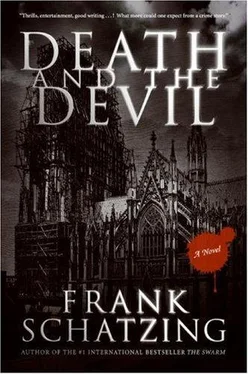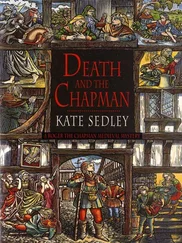The journeyman had been in the Medehuys and it had been to his taste. He went into raptures about the beer, praising every bubble in the foaming head. The way he talked about the effect of drinking this, for him unknown, liquid made Jacob feel like a dusty mug.
He listened, fascinated.
And with every word the tattered journeyman uttered, stuffing pieces of bread into his mouth so greedily he bit his own fingers, Jacob’s dreams took him farther and farther away from the farm and his father, and into the city, even if he had no idea what a provost, a papal legate, or an archbishop was. In his mind’s eye he kept on seeing Isabella’s pure, white face, kept on reliving that one day he had spent in Cologne, and more than ever the city came to represent the true life his mother had told him about when the warmth of her smile still brightened his life.
His father cursed Cologne. Otherwise he said nothing.
The journeyman left and Jacob was slaving away in the fields once more. Another brother died, leaving only him and an elder brother. Their father drove them like draft oxen. The weeks passed with agonizing slowness, one day the same as the next. Summer came, and still he saw the image of Isabella, still Cologne called. He was infected with love and the longing for a different world.
One very hot, very restless night, he got up quietly from his bed of straw, took a hunk of bread, and went out, away from their shack, across their fields until he could no longer see the small, squat hovel.
Then he started to run.
After a while he had to rest. The cathedral estates lay far behind him, the sun was about to rise above the horizon. Hungrily he bit off a piece of bread, decided to stretch out for a while, and fell asleep in the middle of the meadow.
It was the humming of the bees that woke him.
He leaped up, rubbing his eyes to clear them. At first he had no idea where he was, nor how he came to be there. The sun was right overhead; nowhere was there any sign of human habitation, just gently rolling meadows with bushes and tall shrubs. Only a few steps away was the edge of a wood.
Then he remembered. He had run away.
Suddenly he felt small and shabby. He hardly dared look up; he felt God’s eye resting on him with the weight of a death sentence. You have deserted your father and brother, the farm, everything, said God. You are a coward and a traitor, Jacob. You don’t deserve to live. Repent.
Turn back.
For a moment he hesitated. Isabella. The city. Pulsating with life like the heart in his chest. Then he picked up what was left of the bread, turned around dejectedly, and tried to work out which direction he had come from. After casting around for a while, he found the path that led back to the farms. He had run quite a way, he realized, and set off as fast as his legs would carry him.
It was late afternoon when, with a heavy heart, but ready to take his deserved punishment like a man, he came around the hedge bordering the land his father leased. Their hovel could be seen from here and, despite his fear, he was almost glad to be back. He would think up some explanation, perhaps he’d even tell the truth. His father wouldn’t kill him; after all, he needed him in the fields. Perhaps he’d have to go hungry for a day, but he’d survive. Or perhaps he’d have to herd the pigs when it was his brother’s turn. He could live with that, too. Or he’d have to—
His musing came to a sudden halt.
There, some way in front of him, where his home was, a column of dirty brown smoke rose up into the blue sky.
At first he thought his father must be burning some rubbish. It must be a big fire he’d lit. Too big. There was no reason for such a big fire, nothing he could think of, anyway. He looked again.
Their hovel had disappeared.
Jacob felt his limbs go numb and a lock seemed to snap shut in his mind. He felt he couldn’t breathe. His reason pointed out that there ought to be a shack there and demanded that reality go back to the former, accustomed version immediately.
The column of smoke stayed.
Jacob dropped the bread. With a cry he set off running, stumbling over the furrows, waving his hands around wildly, until he was close enough to the dark smoke to see clearly the charred beams that were the remains of his home.
His eyes burned. His mind refused to comprehend, but gradually the terrible truth crept into his mind like a spider.
He went closer.
And closer still.
One more step.
And saw—
—saw—
What?” Richmodis asked softly.
Jacob stared into space. He felt he had fallen backward through time. With difficulty he forced himself to return to the present.
“Yes, what?” Jaspar Rodenkirchen leaned forward. “What was it you saw?”
Jacob was silent.
“Nothing,” he said eventually.
“Nothing? What do you mean, nothing?” exclaimed Goddert, clearly dissatisfied with the answer.
Jacob shrugged his shoulders. “Nothing. There was nothing there. Just charred wood and smoking lumps of peat.”
“What then? What did you do next?”
“What I had intended to do anyway. I went to Cologne.”
“And your father? Your brother? What about—”
Jaspar interrupted him. “One moment. Our young friend has presumably not come here to tell us the whole story of his life, although I have to admit I find it very moving.”
Jacob didn’t know what to say. He had not intended to tell them everything. He hardly knew these people, but they had been hanging on his every word, as if it had been a sermon about the Last Judgment. And it was just the story of any little boy.
A little boy I used to know. That thought suddenly appeared in Jacob’s mind. Was that really me? He felt as if he had been telling the story of someone else, without really knowing why.
“I went to Cologne,” he repeated pensively.
Richmodis placed her hand on his arm. “You don’t have to tell us any more.”
“Why not?” bellowed Goddert. “It’s a truly beautiful and interesting story. You don’t often hear stories like that nowadays. And paying a doctor with a story seems to me a highly original idea.”
Jaspar nodded. “There’s no disputing that. Though once again you can see no farther than the ruby-red tip of your nose. Or do you imagine I could buy wine with stories?”
“Of course you could,” said Jacob.
“I could?” Jaspar’s nose and chin went on the attack together. “Then you know more than I do. How can you do that?”
“You can. I used to have a friend in Cologne, Bram, an old whistle player who lived in a house in Spielmannsgasse, where all the musicians and players live. He was also a storyteller,” Jacob went on. “He would stand at some corner or other and play his whistle, until he had enough people watching. Then he’d start talking about far-off countries, legendary kingdoms, and enchanted castles, about fair princesses and fearless knights, journeys across storm-tossed oceans, combats with giants and sea monsters, and about the world’s end.”
“Nobody’s ever been to the world’s end,” snorted Goddert.
“Maybe. But Bram earned quite a lot of money with his descriptions of it.”
“I remember Bram,” said Jaspar, frowning. “He claimed to have been a crusader.”
Jacob nodded. “Yes. He was on the last Crusade. You should have heard him telling his stories in Haymarket. Everyone listened, even the great merchants, the Hirzelins and Hardefusts, the Quattermarts, Lyskirchner, or Kleingedancks, stopped their horses to listen. Patricians and clerics, monks and nuns, even the suffragan of Great St. Martin’s, the one who’s always fulminating against the works of the Devil. And Bram knew how to tell a story! The merchants laughed at him, claiming his descriptions were completely devoid of truth, but they listened spellbound. And they all gave him something: money, wine, fruit. God knows, we had a good life in those first years.”
Читать дальше












